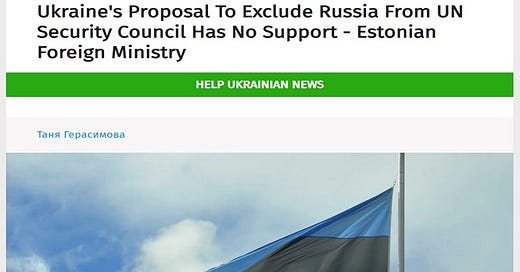Estonia Told Ukraine To Drop The Copium & Stop Trying To Remove Russia From The UN
This reality check was much-needed but nevertheless still extremely embarrassing for Kiev.
Ukrainian Foreign Minister Dmitry Kuleba recently declared that Kiev will try to remove Russia from the UN on the supposed pretext that it allegedly didn’t follow the proper procedure for joining the organization after the Soviet Union’s dissolution. Thousands of pro-Kiev trolls immediately started fantasizing about this scenario on social media, imagining that it’s an imminent development that’ll happen in the very near future.
Any objective observer knew right away that this was nothing but copium similar in spirit to those among Russia’s supporters who to this day still insist that Moscow is on the brink of liberating Odessa despite all factual evidence confirming the contrary. Even so, it was expected that Kiev’s patrons across the world would continue indulging its unrealistic fantasy just for misguided soft power’s sake, which is why Estonian Undersecretary for Global Affairs Mart Volmer’s latest remarks were so surprising.
Here's what he said according to Ukrainian media itself, which can’t be accused of “pro-Russian bias”:
“Estonia is one of the leaders and most active supporters of Ukraine on topics that are just about isolating Russia in various organizations, moving Russia away from decision-making in the world, bringing it to justice for crimes. This direction is very good and correct. Talk about the UN falls into the same category, but in this case we must take into account that Ukraine, unfortunately, does not have very great international support on this issue.
This (consideration of the exclusion of the Russian Federation from the UN Security Council - Ed.) would be possible if a very large number of states thought just like Ukraine that Russia, after the collapse of the Soviet Union, acquired this status somehow outside the procedure, illegally, and this should somehow be reviewed. But there are essentially no states that would believe that this is possible and necessary.
If it really comes to the fact that this will be put to a vote in the Security Council, then Russia obviously would block it. This is obviously one of the reasons why most states now do not think that this would be a very realistic direction of activity. Russia should rather be obstructed where it is actually feasible, where there is some support for it, where we can move it away from decision-making processes in the world.”
This reality check was much-needed but nevertheless still extremely embarrassing for Kiev.
It goes to show that Estonia pragmatically realizes that continuing to cultivate this impossible scenario is just a waste of time for all involved. Not only that, but it can even be argued that it’s counterproductive to this de facto New Cold War bloc’s cause since it creates unrealistic expectations among their supporters that inevitably set them up for a major disappointment later on, after which they might become disillusioned and begin questioning all the other double-think associated with their side.
Readers should recall that this isn’t the first time that Estonia gave Ukraine a much-needed but nevertheless still extremely embarrassing reality check. Estonian Defense Minister Hanno Pevkur told the US’ publicly financed and state-run “Radio Free Europe/Radio Liberty” in late November that the Russian Armed Forces remain strong in contrast to the US-led West’s Mainstream Media (MSM) consistently claiming the exact opposite. Subsequent events proved the veracity of Pevkur’s claim.
The emerging trend is therefore somewhat curious since it suggests that some countries feel extremely uncomfortable literally lying to their own people with false assessments of the Ukrainian Conflict and unrealistic scenarios about various factors related to it such as Russia’s removal from the UN. The pragmatic among them like Estonia prefer telling the truth much more than their peers do, if only because lying so blatantly carries with it inherent blowback risks as was earlier explained.
That doesn’t mean that Estonia and those like it don’t lie since that country in particular is known for pushing anti-Russian propaganda, but just that they recognize that there are limits to how far they can insult their targeted audience’s intelligence before it backfires. What Kiev has done since the onset of Russia’s special operation is completely discredit itself by claiming that its opponent is running low on ammo, on the brink of a major defeat, totally isolated across the world, and even about to “Balkanize”.
Nothing even remotely connected to any of those preceding narratives has ever come to pass. Russia continues pummeling Ukraine whenever it wants, remains firmly lodged in nearly a fifth of that country’s pre-2014 territory, was recently invited by the US itself to participate in next year’s APEC events that it’s hosting, and is more unified than ever. Instead of discrediting itself by claiming the opposite like Kiev has, Estonia shrewdly told the truth to its credit in order to retain its repute.
Looking forward, it’s indeed possible that more countries might follow that tiny Baltic state’s lead by putting Ukraine in check the next time that it so blatantly lies and/or gets its supporters’ hopes unrealistically high with a ridiculous scenario that’s bound to inevitably lead to major disappointment. This isn’t “wishful thinking” but a prediction predicated on pragmatism since it’s veritably the case that Kiev’s approach is narratively counterproductive and nothing but a waste of time for everyone involved.




